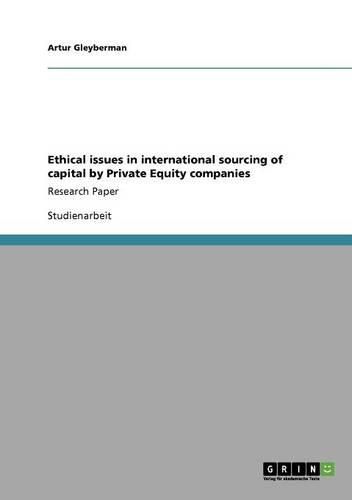Readings Newsletter
Become a Readings Member to make your shopping experience even easier.
Sign in or sign up for free!
You’re not far away from qualifying for FREE standard shipping within Australia
You’ve qualified for FREE standard shipping within Australia
The cart is loading…






Studienarbeit aus dem Jahr 2009 im Fachbereich BWL - Unternehmensfuhrung, Management, Organisation, Note: 3, Nottingham Trent University, Sprache: Deutsch, Anmerkungen: The overall mark of this paper was only sufficient, because of the failure to include the researched data. !!! The main and the most valuable part of this paper is the comprehensive Literature Review (part score: 70% VERY GOOD), which shows previous studies related to ethical issues or concerns in international sourcing and its impact on the host country, community or society. This paper includes also a great list of references!, Abstract: Sourcing of capital by international Private Equity (PE) Companies raises many concerns which led to numerous public and academic arguments. Since PE Companies practice little disclosure about their business activities, they have been surrounded by various myths about their profitability and impact on employment. As the result they have been compared to locusts and accused of negative impact on employment. This paper, based on secondary research, aims to explore which ethical issues PE Companies and the American-based Goldman Sachs Private Equity Group (GS PEG) in particular have been facing while sourcing capital from and into Germany and how they deal with the problem of negative public image. The paper provides relevant PE background information, comprehensive literature review and finally forms the conceptual and ethical framework which is applied to analyse GS PEG. The most interesting findings of the research are that PE Companies do have a slightly negative impact on the employment, but only as catalyst of creative destruction, which means that at large PE Companies create more new jobs and have a positive impact on the economy. Regarding public image, GS PEG pretends to comply with CSR requirements but does not really bind itself to its own Code of Ethics. It was finally found that GS PEG does not experience any significant threat from their struggli
$9.00 standard shipping within Australia
FREE standard shipping within Australia for orders over $100.00
Express & International shipping calculated at checkout
Studienarbeit aus dem Jahr 2009 im Fachbereich BWL - Unternehmensfuhrung, Management, Organisation, Note: 3, Nottingham Trent University, Sprache: Deutsch, Anmerkungen: The overall mark of this paper was only sufficient, because of the failure to include the researched data. !!! The main and the most valuable part of this paper is the comprehensive Literature Review (part score: 70% VERY GOOD), which shows previous studies related to ethical issues or concerns in international sourcing and its impact on the host country, community or society. This paper includes also a great list of references!, Abstract: Sourcing of capital by international Private Equity (PE) Companies raises many concerns which led to numerous public and academic arguments. Since PE Companies practice little disclosure about their business activities, they have been surrounded by various myths about their profitability and impact on employment. As the result they have been compared to locusts and accused of negative impact on employment. This paper, based on secondary research, aims to explore which ethical issues PE Companies and the American-based Goldman Sachs Private Equity Group (GS PEG) in particular have been facing while sourcing capital from and into Germany and how they deal with the problem of negative public image. The paper provides relevant PE background information, comprehensive literature review and finally forms the conceptual and ethical framework which is applied to analyse GS PEG. The most interesting findings of the research are that PE Companies do have a slightly negative impact on the employment, but only as catalyst of creative destruction, which means that at large PE Companies create more new jobs and have a positive impact on the economy. Regarding public image, GS PEG pretends to comply with CSR requirements but does not really bind itself to its own Code of Ethics. It was finally found that GS PEG does not experience any significant threat from their struggli